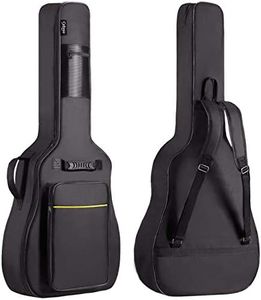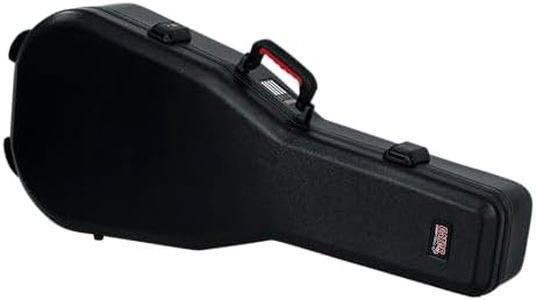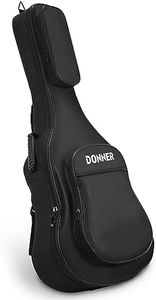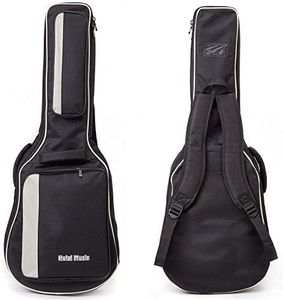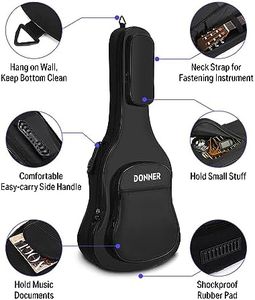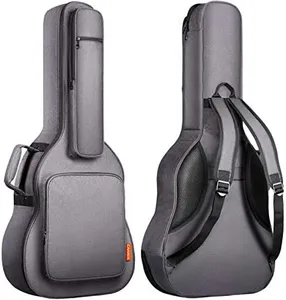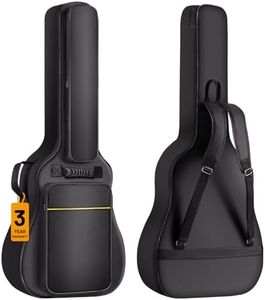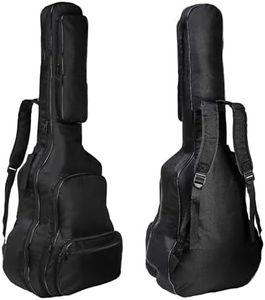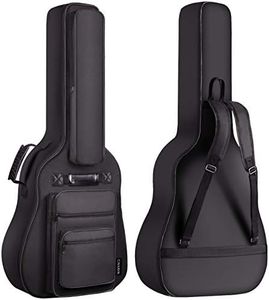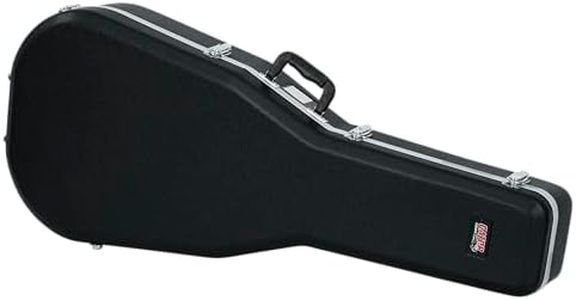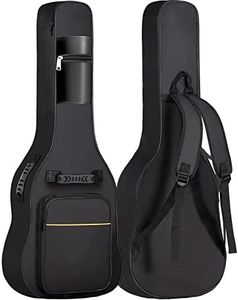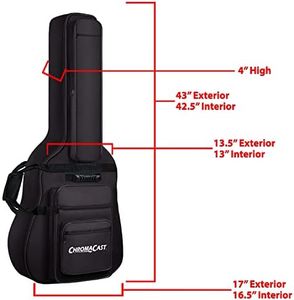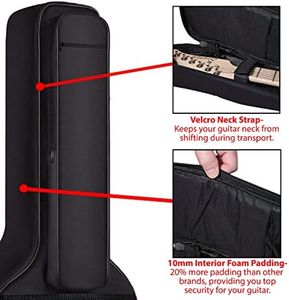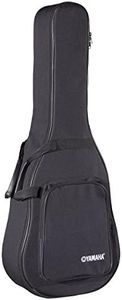10 Best Acoustic Guitar Cases 2025 in the United States
Winner
CAHAYA 41 In Acoustic Guitar Bag 0.35 In Thick Padding Water Resistent Dual Adjustable Shoulder Strap Guitar Case Gig Bag with Back Hanger Loop, Black CY0152
The CAHAYA 41 In Acoustic Guitar Bag stands out as a convenient and protective option for acoustic guitarists. It can fit guitars ranging from 39 to 41 inches, making it versatile for various guitar sizes. The bag is crafted from 600D thick oxford cloth, which offers decent water resistance, making it suitable for light rain conditions. The 0.35-inch padding provides a moderate level of protection against bumps during transport, although it may not be sufficient for more extreme impacts. The interior is designed with a shockproof bottom to further protect the guitar's body from shocks and drops.
Most important from
16340 reviews
Gator Cases Molded Flight Case For Acoustic Dreadnought Guitars With TSA Approved Locking Latches; (GTSA-GTRDREAD)
The Gator Cases Molded Flight Case is specifically designed to fit dreadnought-shaped acoustic guitars. One of its standout features is the ATA roto-molded polyethylene outer shell, which provides excellent durability and protection. This makes it a great option for those who travel frequently or need a robust case for their valuable instrument. The TSA-approved locking latch adds an extra layer of security with impact diversion housings and red release triggers, ensuring that your guitar is safe during transit. The case also includes a set of two keys for convenience.
Most important from
1399 reviews
Donner 40 41 Inch Acoustic Guitar Case, 0.4 Inch Thick Padding Sponge 600D Ripstop Waterproof Nylon Soft Guitar Gig Bag with 3 Pockets and Back Hanger Loop, Black
The Donner 40 41 Inch Acoustic Guitar Case is a soft gig bag designed to protect your acoustic guitar. One of its key strengths is the durable 600D waterproof ripstop nylon material, which is effective in providing weather resistance and durability. The 0.4-inch thick padding and 10mm padded sponge interior are commendable for offering good protection against bumps and minor impacts.
Most important from
4852 reviews
Top 10 Best Acoustic Guitar Cases 2025 in the United States
Winner
9.8 score
CAHAYA 41 In Acoustic Guitar Bag 0.35 In Thick Padding Water Resistent Dual Adjustable Shoulder Strap Guitar Case Gig Bag with Back Hanger Loop, Black CY0152
CAHAYA 41 In Acoustic Guitar Bag 0.35 In Thick Padding Water Resistent Dual Adjustable Shoulder Strap Guitar Case Gig Bag with Back Hanger Loop, Black CY0152
Chosen by 1390 this week
Gator Cases Molded Flight Case For Acoustic Dreadnought Guitars With TSA Approved Locking Latches; (GTSA-GTRDREAD)
Gator Cases Molded Flight Case For Acoustic Dreadnought Guitars With TSA Approved Locking Latches; (GTSA-GTRDREAD)
Donner 40 41 Inch Acoustic Guitar Case, 0.4 Inch Thick Padding Sponge 600D Ripstop Waterproof Nylon Soft Guitar Gig Bag with 3 Pockets and Back Hanger Loop, Black
Donner 40 41 Inch Acoustic Guitar Case, 0.4 Inch Thick Padding Sponge 600D Ripstop Waterproof Nylon Soft Guitar Gig Bag with 3 Pockets and Back Hanger Loop, Black
Gator Cases Hard-Shell Wood Case for 6 or 12 String Acoustic Dreadnought Guitars (GWE-DREAD 12)
Gator Cases Hard-Shell Wood Case for 6 or 12 String Acoustic Dreadnought Guitars (GWE-DREAD 12)
Gator Cases Transit Series Acoustic Guitar Gig Bag; Charcoal Black Exterior (GT-ACOUSTIC-BLK)
Gator Cases Transit Series Acoustic Guitar Gig Bag; Charcoal Black Exterior (GT-ACOUSTIC-BLK)
CAHAYA 40 41 42 In Multi-pockets Acoustic Guitar Bag 6 Pockets 0.4In 10mm Thick Padding Water Resistent Guitar Case Gig Bag CY0181
CAHAYA 40 41 42 In Multi-pockets Acoustic Guitar Bag 6 Pockets 0.4In 10mm Thick Padding Water Resistent Guitar Case Gig Bag CY0181
Gator Cases Deluxe ABS Molded Dreadnought Style Acoustic Guitar Case (Gc-dread)
Gator Cases Deluxe ABS Molded Dreadnought Style Acoustic Guitar Case (Gc-dread)
GLEAM Acoustic Guitar Gig Bag - 0.35 Inch Sponge Padding Fit 39-41 Inch Guitar Waterproof Black
GLEAM Acoustic Guitar Gig Bag - 0.35 Inch Sponge Padding Fit 39-41 Inch Guitar Waterproof Black
7.5 score
Yamaha AG-SC Soft Case Lightweight Dreadnought Acoustic Guitar,Black
Yamaha AG-SC Soft Case Lightweight Dreadnought Acoustic Guitar,Black
Our technology thoroughly searches through the online shopping world, reviewing hundreds of sites. We then process and analyze this information, updating in real-time to bring you the latest top-rated products. This way, you always get the best and most current options available.

